House of the Dragon has brought the dragons back to our world! And, if you know your A Song of Ice and Fire lore, you know their return means the rebirth of magic, including the dragonglass candles with which the learned can communicate at a distance. After a five year hiatus, our Glass Candle Dialogues are back as Luka and I discuss the very first episode of House of the Dragon: favorite characters, hopes for the future, dragon dreams, and that birth scene.
We don’t spoil future events beyond what the trailers reveal, but allusions are made to Fire & Blood from which one could extrapolate spoilerific conclusions!
Luka: I can’t quite believe we’re back.
Petra: It’s been 3 years since Game of Thrones and even longer since our last Glass Candle Dialogue.
Luka: We’ll have to get into the swing of things as we go. How are you doing?
Petra: I’m doing fine. My life’s changed a lot since then. For the better. You?
Luka: I’m old and my back hurts, which feels fitting.
Petra: Oh yeah, we’re both thirty now, aren’t we?
Luka: Yes, we are. I can feel it in my bones.
Petra: Game of Thrones was the show of our twenties. Now, House of the Dragon is the show of our thirties.
Luka: That’s as good a segue as any. Would you say it’s a more “mature” show? Or is it perhaps breaking down just as much as my poor aching body is?
Petra: I love the first episode. I’d say it feels like a show that’s learned from some of the mistakes of Game of Thrones. Obviously it’s early days, but the gender-equal nudity and handling of certain topics we’ll discuss in a bit feel like responses to criticisms levelled at early seasons of Game of Thrones. You?
Luka: For some reason, the first thing that came to mind when you said that is the Los Angeles Times interview with co-showrunner and director Miguel Sapochnik, in which he talks of how they had actual midwives on set for Aemma’s final scene (one of them appears on screen as a midwife), and then showed the result to several women and adjusted it accordingly—apparently some thought the final version wasn’t explicit enough! My first thought about this story was: “Man… that kind of thing sure didn’t happen in Game of Thrones.” As for my first impressions: I loved it too. I hope that doesn’t make the conversation boring!
Petra: Nah, we’ll have plenty to disagree about in the weeks to come. Do you want to jump into the Aemma scene, since you already brought it up?
Luka: Knowing it was going to happen, I was apprehensive about it, not gonna lie. Very much like the showrunners were, apparently. I was… well, “pleasantly” is not the word, but I was surprised in a good way, if that makes sense. It was raw and horrific, but sensibly framed, in my view. What do you think?
Petra: I thought it was a really powerful adaptational choice to put some of the responsibility for Aemma’s death on Viserys. The Grand Maester made it clear that his wife was going to die no matter what, but he made the decision for her that she would die via vivisection (Viserion section?).
Luka: I’m not so sure Mellos can be wholly believed, though. I’m not necessarily saying he’s lying; but he knows the male heir is the priority, and even outside this context he was probably taught to prioritize the child over the mother. Even if there was any way for her to survive with their level of medical technology (not that I know there was), I’m not certain it’s something Mellos would’ve presented to the king, or even thought to present it. I’m just saying: the Maesters are fishy.
Petra: That’s an interesting idea, that he might not have considered it himself. I’ve watched the episode twice, and something that struck me about Viserys in that scene is how deeply he cares about Aemma’s well being. Yet, he didn’t even consider informing her about what was about to happen or asking her for consent. I think he saw it as prioritizing duty over love; it was their duty to provide the realm with an heir, no matter what. Every person I know who’s had a C-section had a really visceral response to that scene, and some felt that it was unnecessarily violent for the sake of shock value. For me, what I appreciated about it was that it frames Aemma as a victim of the patriarchy, not just of nature. Viserys and the Maesters completely disregarded Aemma’s autonomy as they made the decision for her to “bring the babe out” the way they did.
Luka: Yes, that’s what I was kind of dancing around with my Grand Maester comment. I doubt their patriarchal society and teachings leave much room for the agency of the person who’s, you know, actually giving birth.
Petra: So, it establishes the unjust system that Rhaenyra is going to fight to dismantle, or else reform from within, at least as teased by the trailers: “When I am queen I will create a new order.”
Luka: I wonder. Good Queen Alysanne, the Queen Consort of the same king Jaehaerys we briefly met in the prologue, was famous for caring for the wellbeing of all women, be they highborn or lowborn, so it’s not unheard of in this world for noble women to care about every woman. But I don’t think it’s common. Cersei was kind of the opposite: she’s ecstatic to be queen herself, but she’s one of the most misogynistic characters in the series, especially in the books. So, I wonder how they’ll thread the needle with Rhaenyra, you know?
Petra: The gender component is, of course, present in Fire and Blood’s account of the Dance, but there’s no indication that Rhaenyra had Alysanne’s fervor for women’s rights. But in the trailers for House of the Dragon, she expresses a desire to “break the wheel,” as it were. Having her mother be tortured to death the way she was establishes the sort of gendered societal norms she wants to “break.”
Luka: They established her perspective well throughout the premiere: from her one-on-one with Aemma about the role of women in this society and her reluctance to participate in it to Aemma’s needless death and the later funeral scene, in which Rhaenyra only finds the strength to say ‘Dracarys’ after glaring at her father. If you ask me, she seems pretty pissed. So they’re laying the groundwork for this, no doubt. I just wonder how far they’ll go with it.
Petra: Yeah, staying spoiler free, all I’ll say is I’m interested to watch Rhaenyra’s arc unfold. Oh. And I really loved the juxtaposition of the birth scene with the tourney, especially when the shot of baby Baelon cuts directly to Daemon’s “are you not entertained?” pose. This is what victory is for highborn men in battle; it’s all about them. This is what victory in birth is; it’s all about the newborn son.
Luka: In a way, it shows what patriarchy does to women and men: it subjugates and kills women, and it forces men into these displays of toxic masculinity. I believe it’s telling that Daemon can only show any vulnerability when he’s around women he trusts and doesn’t see as threats; Mysaria and Rhaenyra.
Petra: Yes! I’d love it if Daemon turns out to be a deconstruction of toxic masculinity. Although, going back to the Aemma scene, I’m not crazy about Rhaenyra’s line, “I’d rather serve as a knight and ride to battle and glory.”
Luka: It was very Arya, but I found the line a bit too blunt as well. I don’t think I would have if the line was less a generic “I’d rather be a knight riding into battle” and more of a Targaryen “I’d rather be like Aegon’s sister-wives flying into battle.” More specific to her. It would also connect to Rhaenyra wanting to name the child Visenya—one of the conqueror’s queens—if it’s a girl.
Petra: The line also plays into this concept that in a patriarchy the men’s roles are more fun, better, preferable. But fighting in battle sounds awful to me. And the truth is, in a medieval-inspired world like Westeros, where infant mortality is so common, it’s important for anyone with a uterus to have as many children as possible. It’s not that men have choices and women don’t. No one has much say over their own lives. So, I liked that Aemma’s gruesome death demonstrated not just her lack of autonomy but that her life was viewed as fundamentally inferior to that of her son. That’s the problem: the focus of Daemon’s victory at the tourney was Daemon; the focus of Aemma’s “victory” was the heir Viserys craved.
Luka: Not just any heir, in his eyes, either. As we learn later, he probably also thought Baelon could have been the Prince That Was Promised.
Petra: Oh yeah. That. Thoughts on that?
Luka: When we first heard rumblings of this revelation, a lot of A Song of Ice and Fire fanatics were raising their eyebrows. I wasn’t, but I get it. It could seem, depending on the execution, like a cheap addition that only exists to make a desperate connection to the original show in the only way a prequel can: by prophecy. Personally, I thought it was brilliantly executed… Although, admittedly, the line “Aegon called his dream ‘The Song of Ice and Fire’” is a bit of a clunker.
Petra: I’m not against it, I’m just not sure what purpose it serves. The war will be between two Targaryen heirs, so Viserys’ insistence that a Targaryen must be on the throne doesn’t inform that conflict. Also, we know that a Targaryen isn’t on the throne and the Night King gets defeated anyway. I’m not seeing the WHY.
Luka: As I see it, there’s several ‘whys’. There’s the more cynical side to it, of course: “Hey, this connects back to Game of Thrones, we promise!”. But I also think it’s a perfect way to connect the two eras, and the conquest. Martin told the showrunners Aegon had dragon dreams of another Long Night and that’s partly why he conquered Westeros: to make it united. The showrunners extrapolated from that, making it a generational secret, from king to heir. I don’t think that was Martin’s idea, but I do believe making it generational offers House of the Dragon the opportunity to show us exactly how this precious secret was lost, until Rhaegar finds it again. This is the story of the Dance of the Dragons; the beginning of the end for the Targaryen dynasty. It adds to the tragedy if their secret reason for being is lost as so much else is lost in this coming war.
Petra: Okay, I can get on board with that.
Luka: As for the specifics of the prophecy not matching Game of Thrones exactly, I believe Tyrion has the perfect response to that in the books: “Prophecy is like a half-trained mule. It looks as thought it may be useful, but the moment you trust in it, it kicks you in the head.” Dragon dreams are metaphorical in nature and Viserys, like every other Targaryen who’s dreamt them, interprets them the way he wants to. A Targaryen wasn’t “on the Iron Throne” when a second Long Night was averted, but it was two Targaryens who united much of the realm against the threat, and a dagger that (as many of us now suspect) probably belonged to Aegon himself that did the deed. It’s good enough for me, for a dragon dream. Look, I just don’t think the Gods or whoever get a good signal. Either that or the Children of the Forest and later the three-eyed raven too are playing a centuries-old gaslighting prank on the Targaryens, which honestly I’d believe.
Petra: I get what you mean. Culminating all the stories in the threat of the White Walkers has always been one of my least favorite aspects of the books and show. So, I’ll just accept that added element to the mythos and focus my attention on the messy characters making each other’s lives unnecessarily harder.
Luka: Speaking of which. We all know your predilections, okay? No use pretending otherwise. I’m not gonna ask if you’ve found your Theon because it’s too early and it seems like an insulting question anyway.
Petra: I mean, we did see someone have their penis severed.
Luka: I think it was his balls. That mass of blood and skin was very hairy.
Petra: I’d say I’d go back and check but I’m not going to do that.
Luka: Sounds like a job for me then. Later, in my alone time. Anyway, have you found the kind of character you’re usually more attracted to?
Petra: I’ve preemptively selected Aemond to be my favorite character. Not completely sure why. Just got an interesting vibe from him in the trailer.
Luka: Bold choice, considering he isn’t even a glint in his father’s eyes yet. Or a sperm in his balls.
Petra: I’m totally prepared to change my mind as soon as he shows up. But that’s who I’m looking forward to most at the moment. Daemon is more nuanced in the show so far than he is in Fire and Blood and I’m excited to see where they go with him, but he’s not my favorite character right now.
Luka: Would you take a guess at the character that struck me the most?
Petra: I remember you really liked Arya, so I’m going to guess Rhaenyra.
Luka: You’d think. I liked her well enough, and I may grow to like her even more as the season continues. But it was the acting chops of Emily Carey that blew me away. Alicent Hightower wasn’t the focus of the episode, and other actors got more to chew on with their characters, such as Paddy Considine with Viserys and Sian Brooke with Aemma. But, with the comparatively little Carey got, I was so impressed with her Alicent. I didn’t expect to empathize so much with her. But she blew me away from the word go. I don’t know what it is exactly, but she did.
Petra: There’s a lot about her that’s sort of under the surface. The look she gives her dad, Otto, before giving Daemon her favor at the tourney. The fact that she’s tearing at the skin around her fingernails. She’s dealing with a lot but isn’t allowed to talk about it.
Luka: Maybe the fingernails thing was part of why I find her so relatable.
Petra: 🙁
Luka: It’s fine. Mine don’t look that fucked up. Probably because I don’t have the weight she has on her shoulders, or so few “proper” ways to let it out. I’m so gonna enjoy whenever Carey, or perhaps Olivia Cooke by that point, gets to unleash Alicent’s inner anxiety and rage. It’s gonna be a glorious piece of acting, I can already tell, and probably also quite disastrous for the character, sadly, because she isn’t allowed to act out, no matter the circumstances. But it’s not just the tragedy of her that attracted me to the character. Her relationship with Rhaenyra is fascinating—and it’s mostly a show creation, since in the source material she’s nine years older than the princess. Alcock and especially Carey have pointed out the sapphic undertones of their friendship, and I’m glad they did because I was looking around the room going like, “Am I the only one who’s seeing this?” And I was. Because I was watching the show alone. But you get my drift.
Petra: (Laughs) I do. For those who care about canon, there’s hints in Fire and Blood that Rhaenyra may be bisexual, as she becomes “fond and more” of another female character. I hope we see it more unambiguously represented later in the show. I’d say “explicitly represented” except … that means something else.
Luka: It’s HBO. If Aemma’s one-line death in Fire and Blood can become one of the most harrowing things I’ve ever seen, Rhaenyra’s “fond and more” can become something as “explicitly represented” as it gets. Although hopefully we’ll get more than mere nudity and sex, with queer characters getting relationships as complex—and complicated and fucked up—as everyone else’s.
Petra: Definitely. And the world of Westeros could do with better LGBTQ+ representation than it’s had so far.
Luka: I’m sure we’ll have much more to say about that topic when certain characters become more prominent. In the meantime, I want to talk about something else, and perhaps we can end with it, as it’s about looking forward to the rest of the show. Something I loved about this episode, and perhaps dreaded in equal measure, was how ominous it felt throughout. From D’Arcy’s older Rhaenyra darkly proclaiming in the prologue that “The only thing that could tear down the House of the Dragon was itself”, through the horrific birth and to the very end at the heir-naming ceremony, it all felt like constant alarms going off, shouting at us that “this WILL end badly!”. Did you feel similarly?
Petra: I did get a sense of foreboding from the prologue, not so much from the ending. Certainly, one of the biggest challenges this show has is getting the audience invested in a story that we know ends badly. I keep thinking about the ending of Hadestown when Hermes talks about the way we derive meaning from tragedy. “Cause here’s the thing. To know how it ends, and still begin to sing it again as if it might turn out this time.” I’m not a fan of tragic stories in general, and I do find that Martin often leans into defeatism, but since the Dance is a tragedy, I at least like that they establish that explicitly from the very beginning.
Luka: That makes sense, especially after Game of Thrones. I liked season eight more than most people seemed to. There are several obvious criticisms that can be made about it, especially as to how they led Daenerys to her fate, but there’s a difference between storytelling and story: I have my issues about how shortening the last few seasons made some of the character beats feel like character leaps, but I didn’t find Dany’s ending itself to be inadequate. It was tragic, as it was meant to (Sean T. Collins wrote a brilliant piece on this in 2019.) Still, I think a contingent of people honestly wanted her to survive and rule, perhaps even alongside Jon Snow, or to die heroically. And that’s fine, and expected! But it certainly bit the producers and fans in the ass, didn’t it? Establishing from the very first scene that this is a tragedy, the fall of the ‘House of the Dragon’, may be one of the wisest choices they’ve made this premiere. I obviously knew this would be a tragic story, and as I said I loved how they established it through all that ominous foreshadowing and the narration saying it outright, but I hadn’t considered it was done to prepare the audience for a story that will probably end even more bitterly than Game of Thrones did. I just hadn’t thought about it that way, to be honest. See? This is why I like these chats—excuse me, ‘Glass candle dialogues.’ This is magic! Not the Internet!
Petra: (Laughs) No, not at all.
Luka: Any stray thoughts before we wrap it up?
Petra: I’m excited for a main theme, next episode.
Luka: Have you seen my thesis—I mean, annoying Twitter thread—about this?
Petra: I don’t think so. I’ve seen you doing the math to figure out the timeline.
Luka: I’m nothing if not an insufferable nerd. But I wrote about the title sequence too, which this episode lacks but we know we’ll see from the next episode onwards. You’re more interested in the main theme, the actual music, and I am too, but I want to know what they do with the visuals. And I have thoughts.
Petra: Oh yeah, about how House of the Dragon could use artwork to establish the Doom of Valyria and the origin of House Targaryen the way they used the map to establish geography in Game of Thrones?
Luka: Basically, yeah. Game of Thrones was so globe-trotting that they used the intro sequence to help watchers orient themselves geographically. House of the Dragon is a much more focused show geographically, and largely about the Targaryens, so I think the title sequence should do for Westeros’s history what the famous Game of Thrones opening animation did for its geography. Show us the progression of the Targaryens, through historical reliefs and tapestries and history books and family trees. And then they could add new elements as the show goes on and the story we’re witnessing becomes history, which I think is quite fitting for a prequel, especially one that started with a framing device.
My hope for #HouseOfTheDragon‘s opening credits animation is a series of reliefs (like Trajan’s column) or tapestries (like the Bayeux Tapestry), showing us Targaryen history from the Fall of Valyria, to be updated in the future with events we se, just like GOT’s map evolved. pic.twitter.com/p9rQsokf9l
— Luka N. Garay (@LukaNieto) August 19, 2022
Petra: I’d love that. We’ve got three days left until we find out.
Luka: What are you expecting from the main theme? I find music difficult to describe, myself.
Petra: I’m not a musician, so I don’t know most of the jargon.
Luka: You made a wonderful video a few years ago that I believe proves you don’t need the jargon to make yourself understood in this matter, so please go ahead.
Petra: I’d like the dragon motif to be used as the main theme. I look forward to Djawadi composing lots and lots of new melodies for the show, but I think that familiar theme would be a good way to open every episode. The composition that we got for the first official trailer would be my top choice. But I’d also be pleasantly surprised if it’s just a totally brand new melody we’ve never heard before. I don’t think Ramin Djawadi has ever written bad music.
Luka: Even if the main theme turns out to be a brand new composition, I totally expect familiar dragonish motifs. But I guess we’ll know soon enough. Only three more days! What are you looking forward to in episode two?
Petra: Can’t say I’m looking forward to the dissolution of Rhaenyra and Alicent’s friendship, which was teased in most trailers, but I’m very curious to see what destroys their friendship.
Luka: I’m sure the degradation of their relationship will start soon, but I believe it’ll be a slow burn. I’m excited for that as well. Anything else?
Petra: More Mysaria. She didn’t exactly get a lot of development in the premiere.
Luka: She didn’t even get good sex!
Petra: No. Though, I sort of appreciated the hyper-toxically masculine Daemon losing his erection to stress.
Luka: It was, ironically, quite pointed.
Petra: No better way to end this dialogue than with a sex pun.
Luka: A dick joke, even. Now this truly feels like Martin’s world!
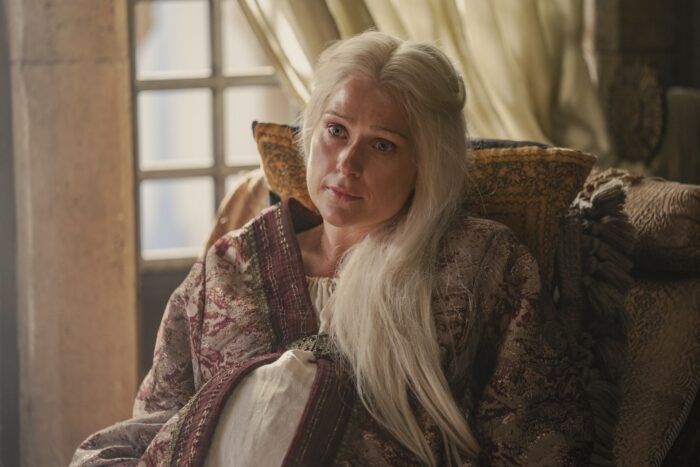
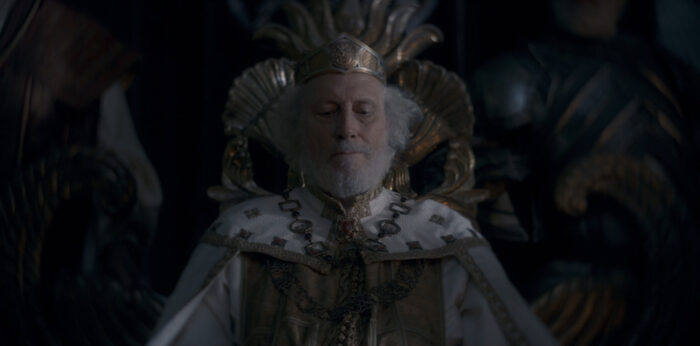
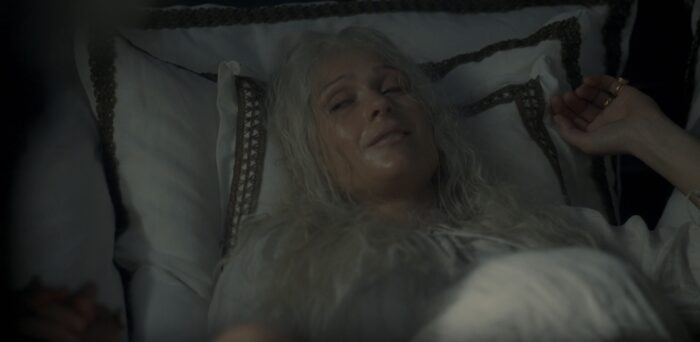
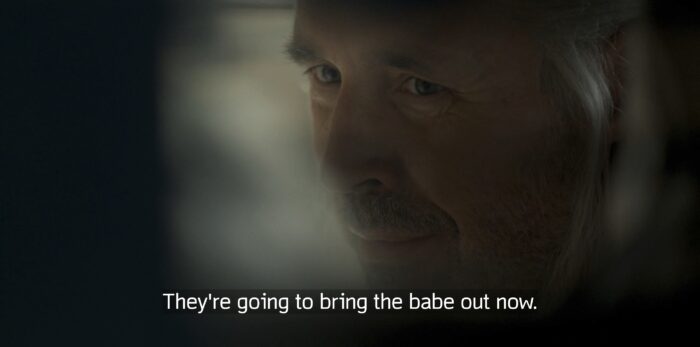
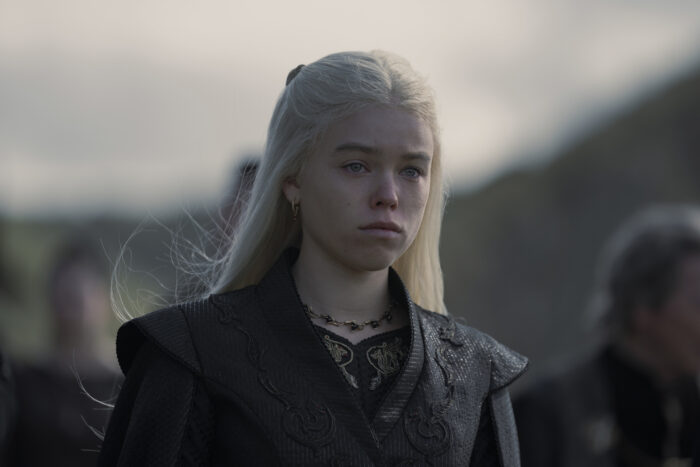
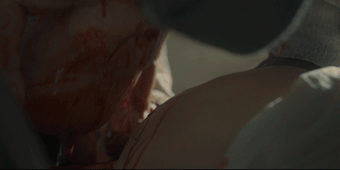
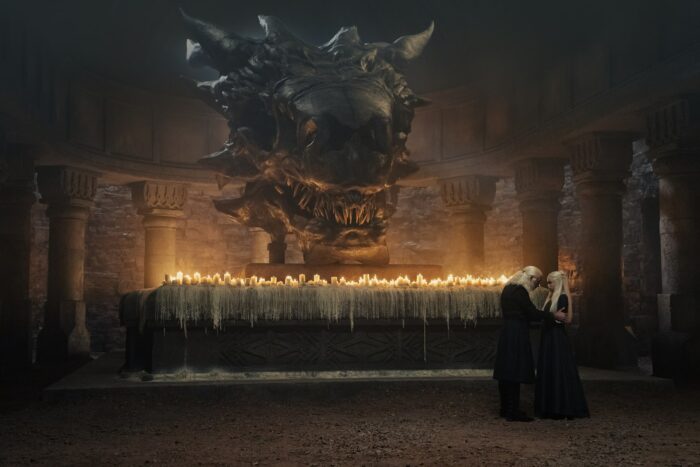
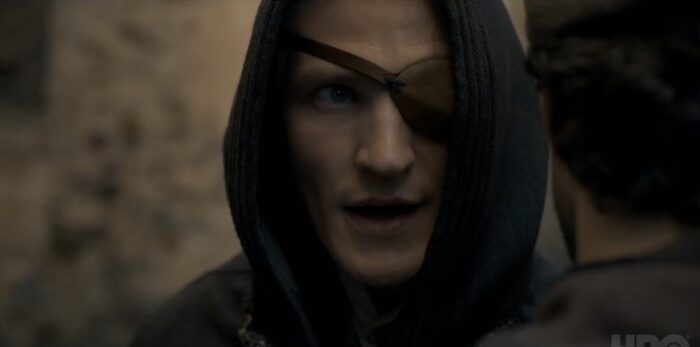
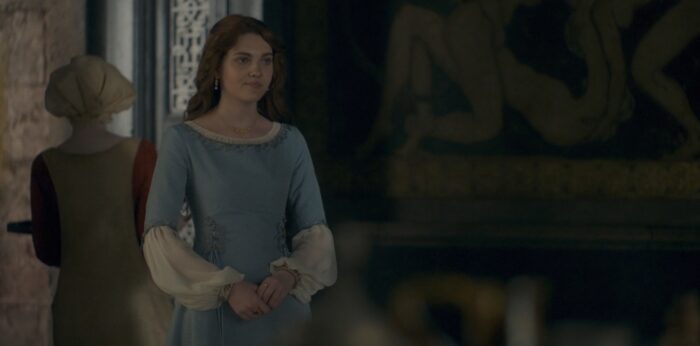
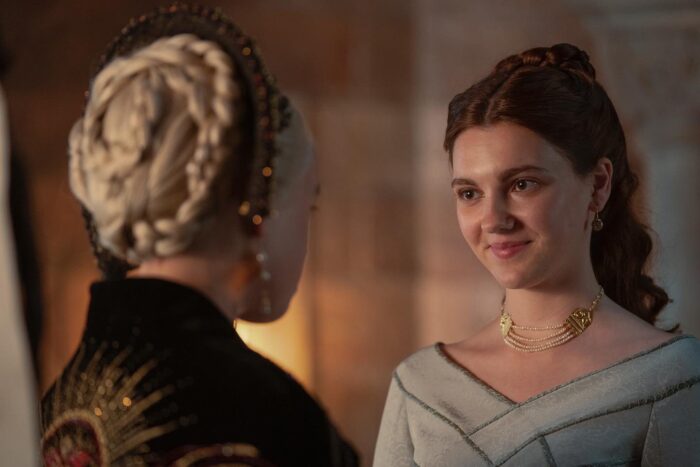
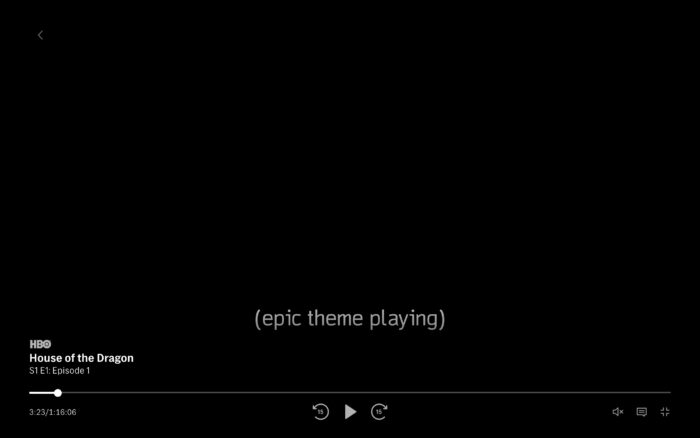
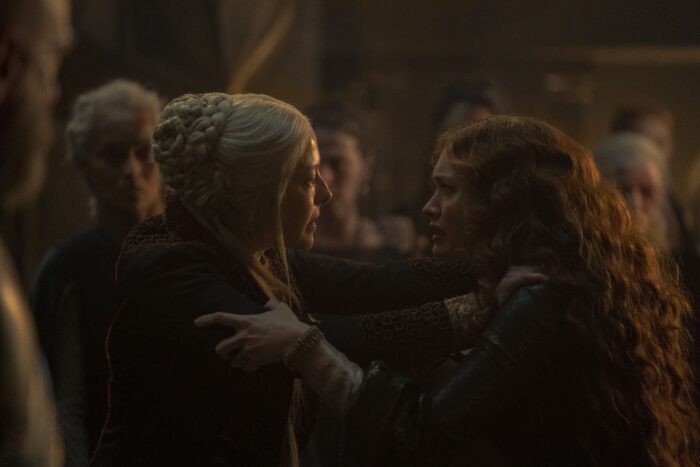
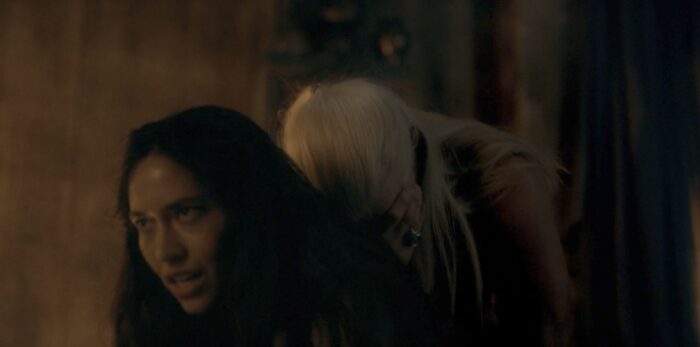
Oh!!! A new Glass Candle Dialogue! I love these. Or should I say “fond and more” ?
I’ll save it to read through later.
P.S. When are you two going to get your own syndicated show?
If you want to get “fond and more” with me or Petra, you’ll have to buy us dinner first!
I like the history opening idea quite a bit, but I had some different thoughts, which maybe would lead in a different direction:
The other really cool thing about the GOT opening credits (as well as geography) was the visual metaphor of gears and machines representing the political machinations that were leading to war. The depth of the the intrigue and scheming, and not the dragons, is what hooked millions of people, and is an element that will hopefully be as rich in this show. So I would like to see something that is equally powerful at representing the corruption of dreams and relationships leading to the elements falling out of order or into place for conflict if that makes sense. Dominos have been hinted at in the final GOT season, but something like that where a chain of events is let loose with disastrous potential.
Hmm, don’t remember this from GoT, but definitely a fun read.
Keep up the magic.
I don’t think Viserys did have a choice. If the baby couldn’t be delivered then there was no hope for Aemma and she was going to die an agonising death whatever happened. How would telling her have helped her in any way? She was doped up anyway and not fully aware. The best he could do was stay with her and show her love to the end, which he did.
That’s it? I would gladly spring for a whirlwind weekend in New York City: deluxe suites at the Ritz Carlton, Broadway shows, monster sandwiches for lunch at Katz’s Deli, dinner at Nobu in Tribeca…
Ten Bears,
… and a jaunt to Greenwich Village to find the place that sells real Tarocco blood oranges imported from Sicily.
I don’t think you should try to rationalize this. Not letting her choose her own fate was treating her as a non-person. Maybe, if she had been informed of what was happening at ALL she would have made the same choice, but they took her autonomy away from her by telling Viserys and not her. It was HER choice to make.
What exactly would you have said to her?
Grandmaester Flash,
Simple, tell her what was told to Viserys. Being a bit doped up shouldn’t have made much difference – being in labor is more of an animalistic state anyway AND women can still hear the truth and respond. FWIW, I had a difficult labor and, as still-not-there US birthing system is, they treated me as a full-fledged person and spoke to me directly about what was going on and what choices I needed to make. This is, sadly, a recent development here in the US and many women still aren’t treated with respect while they’re birthing. But, I share this to demonstrate the contrast. In the world of Westeros, they do not view women as full humans with agency. This was demonstrated in many scenes in just one episode: the birth scene, the one with Viserys not listening to Aemma when she said she wanted no more pregnancies, Otto making Alicent go to Viserys, the small counsel discussion about Raenyra and Daemon as successors, and Raenerys being passed over.
Agree with awol, we aren’t supposed to rationalize. The show runners (and actors) have been clear in many interviews. They are hitting us over the head with the message that women have no agency in this world. And we’re going to see them trying to push the boundaries.
What I’m noticing is how balls-to-the-wall Cersei was in contrast. She was married off to a disgusting lout and took matters into her own hands. In many ways it’s Cersei who broke the wheel before Dany even got to Westeros.
“Martin told the showrunners Aegon had dragon dreams of another Long Night and that’s partly why he conquered Westeros: to make it united. The showrunners extrapolated from that, making it a generational secret, from king to heir. I don’t think that was Martin’s idea,”
Judging from everything I’ve read on this and how it’s been reported, there’s every reason to believe there’s no extrapolation going on here and the generational secret aspect also comes straight from him, especially considering that he has consistently said he has much more input and influence on HotD. They have also stated that this show is meant to be the objective account of these events, which necessarily entails revealing previously unknown details that are completely missing from Fire and Blood, and that is definitely being done with his approval. Frankly, I think this approach is actually a surprisingly clever move on his part, considering the status of the books.
I have my thoughts on exactly how the passing of this secret was likely lost during the course of the Dance based on events we do know about from F&B, but time will tell.